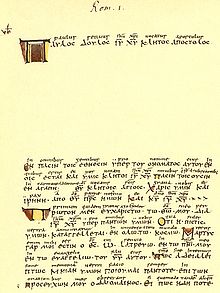Lacuna (manuscripts)

First page of the Codex Boernerianus with lacuna in Romans 1:1-4
A lacuna[Note 1] (pl. lacunae or lacunas) is a gap in a manuscript, inscription, text, painting, or a musical work. A manuscript, text, or section suffering from gaps is said to be "lacunose" or "lacunulose". Some books intentionally add lacunas to be filled in by the owner (e.g., "The _____ played with the _____ in the _____."), often as a game or to encourage children to create their own stories.
Weathering, decay, and other damage to old manuscripts or inscriptions are often responsible for lacunae—words, sentences, or whole passages that are missing or illegible. Palimpsests are particularly vulnerable. To reconstruct the original text, the context must be considered. In papyrology and textual criticism this may lead to competing reconstructions and interpretations. Published texts that contain lacunae often mark the section where text is missing with a bracketed ellipsis. For example, "This sentence contains 20 words, and [...] nouns," or, "Finally, the army arrived at [...] and made camp."
Contents
1 Famous examples
2 See also
3 Notes
4 References
Famous examples
- A famous Old English example of a lacuna is in the manuscript British Library MS Cotton Vitellius A. xv, the poem Beowulf:
- hyrde ich thæt [... ...On]elan cwen. (Fitt 1, line 62)
- hyrde ich thæt [... ...On]elan cwen. (Fitt 1, line 62)
- This particular lacuna is always reproduced in editions of the text, but many people have attempted to fill it, notably editors Wyatt-Chambers and Dobbie, among others, who accept the verb "waes" (was). Malone (1929) proposed the name Yrse for the unnamed queen, as that would alliterate with Onela. This is still hotly debated amongst editors, however.[3]
- Another notable lacuna is the eight-leaves-long Great Lacuna in the Codex Regius, the most prominent source for Norse mythology and early Germanic heroic legends. Parts of it survived in independent manuscripts and in prose form in the Völsunga saga.
- In Codex Leicester the text skips from Acts 10:45 to 14:17 without a break; possibly a scribe rewrote it from a defective manuscript.
See also
- Unfinished work
- Leiden Conventions
Notes
^ From Latin lacūna ("ditch, gap"), literally "little lacus" ("lake, basin").[1][2]
References
^ Harper, Douglas. "lacuna". Online Etymology Dictionary..mw-parser-output cite.citation{font-style:inherit}.mw-parser-output q{quotes:"""""""'""'"}.mw-parser-output code.cs1-code{color:inherit;background:inherit;border:inherit;padding:inherit}.mw-parser-output .cs1-lock-free a{background:url("//upload.wikimedia.org/wikipedia/commons/thumb/6/65/Lock-green.svg/9px-Lock-green.svg.png")no-repeat;background-position:right .1em center}.mw-parser-output .cs1-lock-limited a,.mw-parser-output .cs1-lock-registration a{background:url("//upload.wikimedia.org/wikipedia/commons/thumb/d/d6/Lock-gray-alt-2.svg/9px-Lock-gray-alt-2.svg.png")no-repeat;background-position:right .1em center}.mw-parser-output .cs1-lock-subscription a{background:url("//upload.wikimedia.org/wikipedia/commons/thumb/a/aa/Lock-red-alt-2.svg/9px-Lock-red-alt-2.svg.png")no-repeat;background-position:right .1em center}.mw-parser-output .cs1-subscription,.mw-parser-output .cs1-registration{color:#555}.mw-parser-output .cs1-subscription span,.mw-parser-output .cs1-registration span{border-bottom:1px dotted;cursor:help}.mw-parser-output .cs1-hidden-error{display:none;font-size:100%}.mw-parser-output .cs1-visible-error{font-size:100%}.mw-parser-output .cs1-subscription,.mw-parser-output .cs1-registration,.mw-parser-output .cs1-format{font-size:95%}.mw-parser-output .cs1-kern-left,.mw-parser-output .cs1-kern-wl-left{padding-left:0.2em}.mw-parser-output .cs1-kern-right,.mw-parser-output .cs1-kern-wl-right{padding-right:0.2em}
^ lacuna, lacus. Charlton T. Lewis and Charles Short. A Latin Dictionary on Perseus Project.
^ G. Jack, "Beowulf: A Student Edition", Oxford University Press, Oxford: 1994. Pp.31-32, footnote 62.
This article about a manuscript is a stub. You can help Wikipedia by expanding it. |